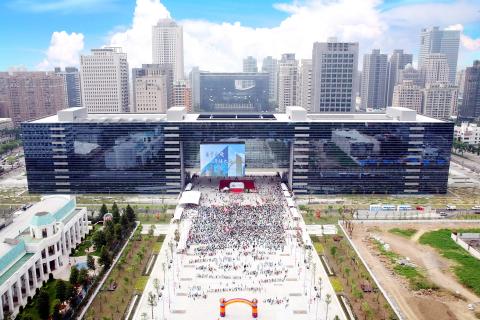Taichung last week became the nation’s second-largest city by population and as a growing city, it proves that the Forward-looking Infrastructure Development Program needs to be passed to support continued growth, Taichung-based Deputy Legislative Speaker Tsai Chi-chang (蔡其昌) said.
The Ministry of the Interior on Friday published its newest statistics, which showed that by the end of last month, Taichung’s population exceeded Kaohsiung’s by 309 residents, officially becoming the second-largest of the six special municipalities.
New Taipei City had the biggest population at 3.9 million, while Taichung and Kaohsiung both had about 2.7 million, Taipei came in fourth at 2.68 million, Taoyuan had 2.1 million and Tainan was the smallest, with 1.8 million inhabitants, according to official statistics.

Photo: Su Chin-feng, Taipei Times
The nation’s total recorded population was 23.55 million, an increase of 40,000 from last year, ministry data showed.
Tsai, a member of the Democratic Progressive Party (DPP), said that Taichung, long ignored in the national distribution of funds, spent longer coming into its own compared with Taipei and Kaohsiung.
The Forward-looking Program would give Taichung a chance to lead instead of remaining a forgotten rural backwater, he said.
Chinese Nationalist Party (KMT) Legislator Yan Kuan-heng (顏寬恒) said Taichung surpassing Kaohsiung was not a coincidence, as the city is home to both a seaport and an airport, and a decreasing crime rate adds to its appeal.
Local industries should ponder how to attract investment and create jobs, and both the municipal and the national government must give attention to falling birth rates if they wish to be “forward looking,” Yan said.
The establishment of special municipalities in 2010 was not the only impetus for Taichung’s growth; the policies of subsequent mayors also played a great role, Yan said.
Kaohsiung, the former second-largest municipality, should give due thought to what Taichung did right, he added.
Meanwhile, DPP Legislator Chao Tien-lin (趙天麟), whose constituency is in Kaohsiung, congratulated Taichung, but said his city’s residents would undoubtedly have experienced mixed emotions upon hearing the news.
Kaohsiung’s failure to change its industry mix from petrochemical factories to new technology and science parks directly contributed to the city developing more slowly over the past four decades, despite an initial population advantage, Chao said.
Chao added that Taichung had seen a more balanced development, whereas in recent years, the population in Kaohsiung’s Fengshan District (鳳山) increased by 40,000, whereas the former city center’s population, as well as that in Gangshan (岡山) and Cishan (旗山) districts had declined.
Industry and urban development should be given equal weight in the debate about Kaohsiung’s future, he said.
KMT Legislator Chen Yi-min (陳宜民), who represents another Kaohsiung constituency, said the city’s relative stagnation was hardly a shock.
A city’s competitive edge is maintained by creating an atmosphere of a city on the rise, he said.
Kaohsiung Mayor Chen Chu (陳菊) is hardworking, but judging by the city’s modest population increase over the past 11 years, net decrease over the past two years and net emigration, other city mayors had outperformed her, he said.
Chen Yi-min also pointed to a failure to shift away from petrochemical industries as the main reason for Kaohsiung’s stagnancy.
The gradual phasing out of the petrochemical cluster and lack of new businesses means a net decrease of jobs and a decreased ability to retain students that have come to Kaohsiung to study, and does not encourage former Kaohsiung residents to return, Chen Yi-min said.

CAUTION: Based on intelligence from the nation’s security agencies, MOFA has cautioned Taiwanese travelers about heightened safety risks in China-friendly countries The Ministry of Foreign Affairs (MOFA) yesterday urged Taiwanese to be aware of their safety when traveling abroad, especially in countries that are friendly to China. China in June last year issued 22 guidelines that allow its courts to try in absentia and sentence to death so-called “diehard” Taiwanese independence activists, even though Chinese courts have no jurisdiction in Taiwan. Late last month, a senior Chinese official gave closed-door instructions to state security units to implement the guidelines in countries friendly to China, a government memo and a senior Taiwan security official said, based on information gathered by Taiwan’s intelligence agency. The

The National Immigration Agency (NIA) said yesterday that it will revoke the dependent-based residence permit of a Chinese social media influencer who reportedly “openly advocated for [China’s] unification through military force” with Taiwan. The Chinese national, identified by her surname Liu (劉), will have her residence permit revoked in accordance with Article 14 of the “Measures for the permission of family- based residence, long-term residence and settlement of people from the Mainland Area in the Taiwan Area,” the NIA said in a news release. The agency explained it received reports that Liu made “unifying Taiwan through military force” statements on her online

Taiwan Semiconductor Manufacturing Co (TSMC), the world’s largest contract chipmaker, said yesterday that it is looking to hire 8,000 people this year, at a time when the tech giant is expanding production capacity to maintain its lead over competitors. To attract talent, TSMC would launch a large-scale recruitment campaign on campuses across Taiwan, where a newly recruited engineer with a master’s degree could expect to receive an average salary of NT$2.2 million (US$60,912), which is much higher than the 2023 national average of NT$709,000 for those in the same category, according to government statistics. TSMC, which accounted for more than 60 percent

A magnitude 5.7 earthquake struck off Taitung County at 1:09pm today, the Central Weather Administration (CWA) said. The hypocenter was 53km northeast of Taitung County Hall at a depth of 12.5km, CWA data showed. The intensity of the quake, which gauges the actual effect of a seismic event, measured 4 in Taitung County and Hualien County on Taiwan's seven-tier intensity scale, the data showed. The quake had an intensity of 3 in Nantou County, Chiayi County, Yunlin County, Kaohsiung and Tainan, the data showed. There were no immediate reports of damage following the quake.